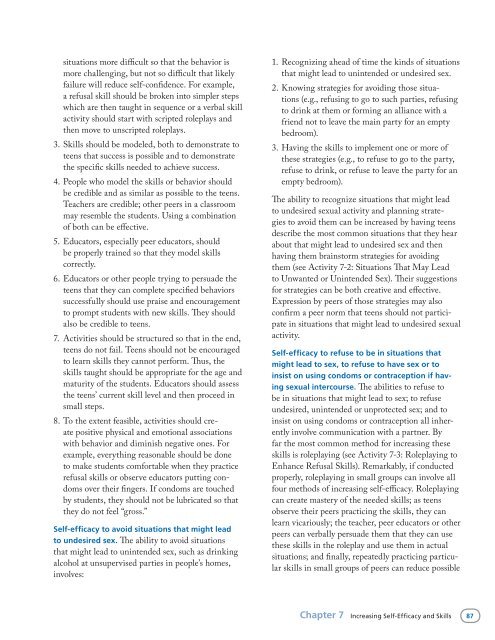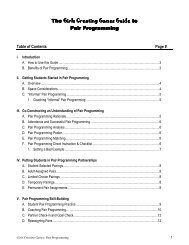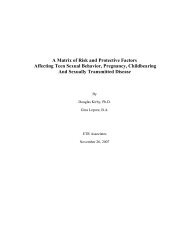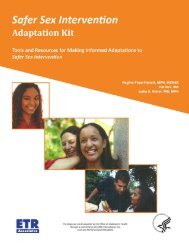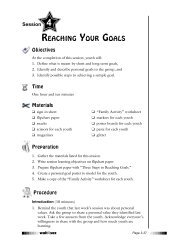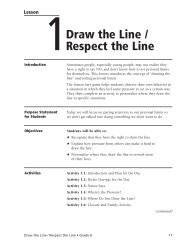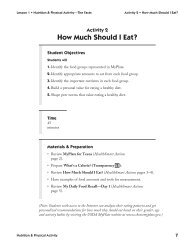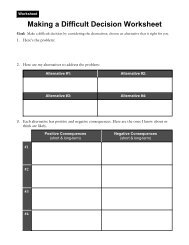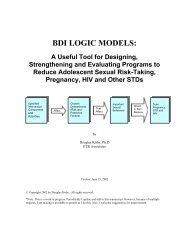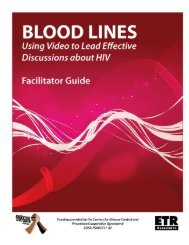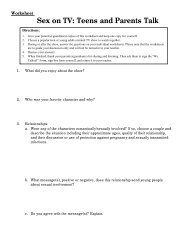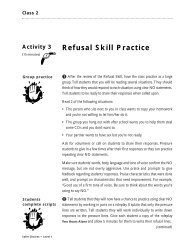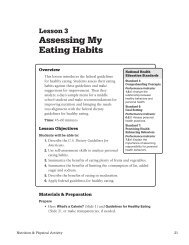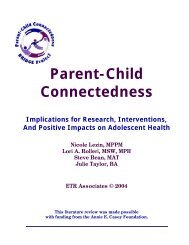Reducing Adolescent Sexual Risk: A Theoretical - ETR Associates
Reducing Adolescent Sexual Risk: A Theoretical - ETR Associates
Reducing Adolescent Sexual Risk: A Theoretical - ETR Associates
- No tags were found...
You also want an ePaper? Increase the reach of your titles
YUMPU automatically turns print PDFs into web optimized ePapers that Google loves.
situations more difficult so that the behavior ismore challenging, but not so difficult that likelyfailure will reduce self-confidence. For example,a refusal skill should be broken into simpler stepswhich are then taught in sequence or a verbal skillactivity should start with scripted roleplays andthen move to unscripted roleplays.3. Skills should be modeled, both to demonstrate toteens that success is possible and to demonstratethe specific skills needed to achieve success.4. People who model the skills or behavior shouldbe credible and as similar as possible to the teens.Teachers are credible; other peers in a classroommay resemble the students. Using a combinationof both can be effective.5. Educators, especially peer educators, shouldbe properly trained so that they model skillscorrectly.6. Educators or other people trying to persuade theteens that they can complete specified behaviorssuccessfully should use praise and encouragementto prompt students with new skills. They shouldalso be credible to teens.7. Activities should be structured so that in the end,teens do not fail. Teens should not be encouragedto learn skills they cannot perform. Thus, theskills taught should be appropriate for the age andmaturity of the students. Educators should assessthe teens’ current skill level and then proceed insmall steps.8. To the extent feasible, activities should createpositive physical and emotional associationswith behavior and diminish negative ones. Forexample, everything reasonable should be doneto make students comfortable when they practicerefusal skills or observe educators putting condomsover their fingers. If condoms are touchedby students, they should not be lubricated so thatthey do not feel “gross.”Self-efficacy to avoid situations that might leadto undesired sex. The ability to avoid situationsthat might lead to unintended sex, such as drinkingalcohol at unsupervised parties in people’s homes,involves:1. Recognizing ahead of time the kinds of situationsthat might lead to unintended or undesired sex.2. Knowing strategies for avoiding those situations(e.g., refusing to go to such parties, refusingto drink at them or forming an alliance with afriend not to leave the main party for an emptybedroom).3. Having the skills to implement one or more ofthese strategies (e.g., to refuse to go to the party,refuse to drink, or refuse to leave the party for anempty bedroom).The ability to recognize situations that might leadto undesired sexual activity and planning strategiesto avoid them can be increased by having teensdescribe the most common situations that they hearabout that might lead to undesired sex and thenhaving them brainstorm strategies for avoidingthem (see Activity 7-2: Situations That May Leadto Unwanted or Unintended Sex). Their suggestionsfor strategies can be both creative and effective.Expression by peers of those strategies may alsoconfirm a peer norm that teens should not participatein situations that might lead to undesired sexualactivity.Self-efficacy to refuse to be in situations thatmight lead to sex, to refuse to have sex or toinsist on using condoms or contraception if havingsexual intercourse. The abilities to refuse tobe in situations that might lead to sex; to refuseundesired, unintended or unprotected sex; and toinsist on using condoms or contraception all inherentlyinvolve communication with a partner. Byfar the most common method for increasing theseskills is roleplaying (see Activity 7-3: Roleplaying toEnhance Refusal Skills). Remarkably, if conductedproperly, roleplaying in small groups can involve allfour methods of increasing self-efficacy. Roleplayingcan create mastery of the needed skills; as teensobserve their peers practicing the skills, they canlearn vicariously; the teacher, peer educators or otherpeers can verbally persuade them that they can usethese skills in the roleplay and use them in actualsituations; and finally, repeatedly practicing particularskills in small groups of peers can reduce possibleChapter 7 Increasing Self-Efficacy and Skills 87


